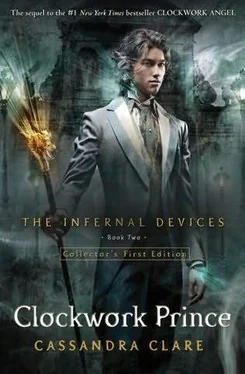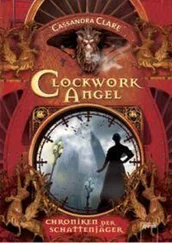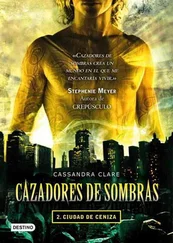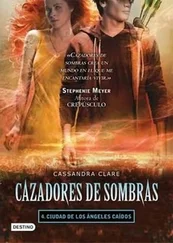“She just . . .” Sophie let out a gusty sigh. “She isn’t very amiable. Agatha was my friend, but Bridget—well, we have a way of talking, among us servants, you know, usually, but Bridget just won’t. Cyril’s friendly enough, but Bridget just keeps to herself in the kitchen, singing those awful Irish ballads of hers. I’d wager she’s singing one now.”
They were passing not far from the scullery door; Sophie gestured for Tessa to follow her, and together they crept close and peered inside. The scullery was quite large, with doors leading off to the kitchen and pantry. The sideboard was piled with food meant for dinner—fish and vegetables, lately cleaned and prepared. Bridget stood at the sink, her hair standing out around her head in wild red curls, made frizzy by the humidity of the water. She was singing too; Sophie had been quite right about that. Her voice drifting over the sound of the water was high and sweet.
“Oh, her father led her down the stair,
Her mother combed her yellow hair.
Her sister Ann led her to the cross,
And her brother John set her on her horse.
‘Now you are high and I am low,
Give me a kiss before ye go.’
She leaned down to give him a kiss,
He gave her a deep wound and did not miss.
And with a knife as sharp as a dart,
Her brother stabbed her to the heart.”
Nate’s face flashed in front of Tessa’s eyes, and she shuddered. Sophie, looking past her, didn’t seem to notice. “That’s all she sings about,” she whispered. “Murder and betrayal. Blood and pain. It’s horrid.”
Mercifully Sophie’s voice covered the end of the song. Bridget had begun drying dishes and started up with a new ballad, the tune even more melancholy than the first.
“Why does your sword so drip with blood,
Edward, Edward?
Why does your sword so drip with blood?
And why so sad are ye?”
“Enough of this.” Sophie turned and began hurrying down the hall; Tessa followed. “You do see what I meant, though? She’s so dreadfully morbid, and it’s awful sharing a room with her. She never says a word in the morning or at night, just moans—”
“You share a room with her?” Tessa was astonished. “But the Institute has so many rooms—”
“For visiting Shadowhunters,” Sophie said. “Not for servants.” She spoke matter-of-factly, as if it would never have occurred to her to question or complain about the fact that dozens of grand rooms stood empty while she shared a room with Bridget, singer of murderous ballads.
“I could talk to Charlotte—,” Tessa began.
“Oh, no. Please don’t.” They had reached the door to the training room. Sophie turned to her, all distress. “I wouldn’t want her to think I’d been complaining about the other servants. I really wouldn’t, Miss Tessa.”
Tessa was about to assure the other girl that she would say nothing to Charlotte if that was what Sophie really wanted, when she heard raised voices from the other side of the training room door. Gesturing at Sophie to be quiet, she leaned in and listened.
The voices were quite clearly those of the Lightwood brothers. She recognized Gideon’s lower, rougher tones as he said, “There will be a moment of reckoning, Gabriel. You can depend upon it. What will matter is where we stand when it comes.”
Gabriel replied, his voice tense, “We will stand with Father, of course. Where else?”
There was a pause. Then, “You don’t know everything about him, Gabriel. You don’t know all that he has done.”
“I know that we are Lightwoods and that he is our father. I know he fully expected to be named head of the Institute when Granville Fairchild died—”
“Maybe the Consul knows more about him than you do. And more about Charlotte Branwell. She isn’t the fool you think she is.”
“Really?” Gabriel’s voice was a sneer. “Letting us come here to train her precious girls, doesn’t that make her a fool? Shouldn’t she have assumed we’d be spying for our father?”
Sophie and Tessa looked at each other with round eyes.
“She agreed to it because the Consul forced her hand. And besides, we are met at the door here, escorted to this room, and escorted out. And Miss Collins and Miss Gray know nothing of import. What damage is our presence here really doing her, would you say?”
There was a silence through which Tessa could almost hear Gabriel sulking. At last he said, “If you despise Father so much, why did you ever come back from Spain?”
Gideon replied, sounding exasperated, “I came back for you —”
Sophie and Tessa had been leaning against the door, ears pressed to the wood. At that moment the door gave way and swung open. Both straightened hastily, Tessa hoping that no evidence of their eavesdropping appeared on their faces.
Gabriel and Gideon were standing in a patch of light at the center of the room, facing off against each other. Tessa noticed something she had not noticed before: Gabriel, despite being the younger brother, was lankily taller than Gideon by some inches. Gideon was more muscular, broader through the shoulders. He swept a hand through his sandy hair, nodding curtly to the girls as they appeared in the doorway. “Good day.”
Gabriel Lightwood strode across the room to meet them. He really was quite tall, Tessa thought, craning her neck to look up at him. As a tall girl herself, she didn’t often find herself bending her head back to look up at men, though both Will and Jem were taller than she was.
“Miss Lovelace still regrettably absent?” he inquired without bothering to greet them. His face was calm, the only sign of his earlier agitation a pulse hammering just beneath a Courage in Combat rune inked upon his throat.
“She continues to have the headache,” said Tessa, following him into the training room. “We don’t know how long she’ll be indisposed.”
“Until these training sessions are over, I suspect,” said Gideon, so dryly that Tessa was surprised when Sophie laughed. Sophie immediately composed her features again, but not before Gideon had given her a surprised, almost appreciative glance, as if he weren’t used to having his jokes laughed at.
With a sigh Gabriel reached up and freed two long sticks from their holsters on the wall. He handed one to Tessa. “Today,” he began, “we shall be working on parrying and blocking . . .”
As usual, Tessa lay awake a long time that night before sleep began to come. Nightmares had plagued her recently—usually of Mortmain, his cold gray eyes, and his colder voice saying measuredly that he had made her, that There is no Tessa Gray.
She had come face-to-face with him, the man they sought, and still she did not really know what he wanted from her. To marry her, but why? To claim her power, but to what end? The thought of his cold lizardlike eyes on her made her shiver; the thought that he might have had something to do with her birth was even worse. She did not think anyone—not even Jem, wonderful understanding Jem—quite understood her burning need to know what she was , or the fear that she was some sort of monster, a fear that woke her in the middle of the night, leaving her gasping and clawing at her own skin, as if she could peel it away to reveal a devil’s hide beneath.
Just then she heard a rustle at her door, and the faint scratch of something being gently pushed against it. After a moment’s pause she slid off the bed and padded across the room.
She eased the door open to find an empty corridor, the faint sound of violin music drifting from Jem’s room across the hall. At her feet was a small green book. She picked it up and gazed at the words stamped in gold on its spine: “ Vathek , by William Beckford.”
Читать дальше











